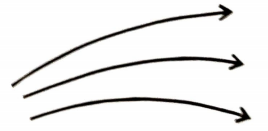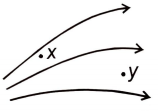A charge Q is placed at the centre of a square. If the electric field intensity due to the charges at the corners of the square is E1 and the intensity at the midpoint of the side of the square is E2, then the ratio will be:
1.
2.
3.
4.
Point charges, each of magnitude Q, are placed at the three corners of a square as shown in the diagram. What is the direction of the resultant electric field at point A?
1. OC
2. OE
3. OD
4. OB
Two charges e and 3e are placed at a distance r. The distance of the point where the electric field intensity will be zero is:
1. from 3e charge.
2. from e charge.
3. from 3e charge.
4. from e charge.
If the electric lines of force in a region are represented as shown in the figure, then one can conclude that the electric field is:

1. Non-uniform
2. Uniform
3. Both uniform and non-uniform
4. Zero everywhere
An uncharged sphere of metal is placed in a uniform electric field produced by two oppositely charged plates. The lines of force will appear as:
1.
2.
3.
4.
An electron released on the axis of a positively charged ring at a large distance from the centre will:
1. not move.
2. do oscillatory motion.
3. do SHM.
4. do non-periodic motion.
The figure shows electric lines of forces due to charges Q1 and Q2. Hence,
1. Q1 and Q2 both are negative.
2. Q1 and Q2 both are positive.
3. Q1 > Q2
4. Both (2) and (3)
The figure shows the electric lines of force. If Ex and Ey are the magnitudes of the electric field at points x and y respectively, then:

1.
2.
3.
4. Any of these
Electric charges Q, Q and -2Q respectively are placed at the three corners of an equilateral triangle of side a. The magnitude of the electric dipole moment of the system is:
1.
2.
3. Qa
4. 2Qa
An electric dipole placed in a uniform electric field experiences a maximum moment of couple when the dipole is placed:
1. against the direction of the field.
2. towards the electric field.
3. perpendicular to the direction of the field.
4. at to the direction of the field.












